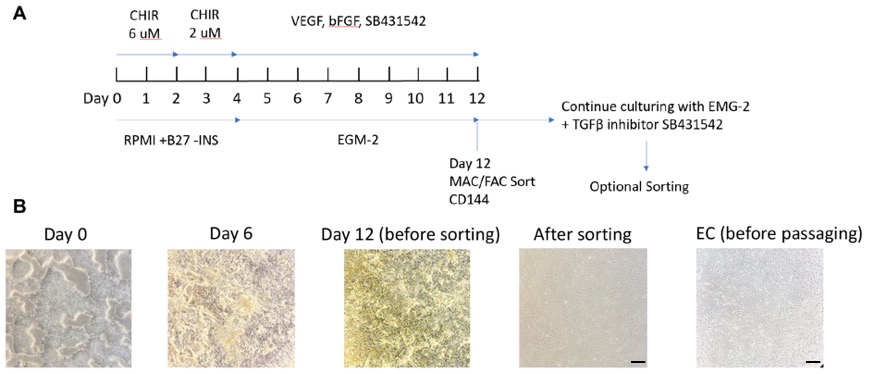Advanced Search
Generation of Endothelial Cells from Human Induced Pluripotent Stem Cells
Published: Nov 20, 2018 DOI: 10.21769/BioProtoc.3086 Views: 6470
Edited by: Joe Zhang Reviewed by: Iman Saramipoor Behbahan
Abstract
Endothelial cells (ECs), as important constituent of blood vessel are crucial to maintaining vascular tone, and any dysfunction in ECs could lead to many diseases of the vascular system. Due to limited availability of human samples, most of our research has been limited to animal models. Induced pluripotent stem cells (iPSCs) due to their potential to differentiate into any cell type of the human body, including cells of the cardiovascular system, provide us with a great opportunity to study human vascular disease. This protocol describes an efficient, simple, and step-wise method to differentiate iPSCs to endothelial cells (iPSC-ECs) using small molecules and growth factors. Through the activation of WNT signaling pathway, iPSCs are differentiated towards a mesodermal lineage with the potential to generate endothelial progenitors. These progenitors are further stimulated with growth factors to generate endothelial cells (Figure 1A).
Figure 1. Stepwise differentiation strategy for iPSCs endothelial cell differentiation. A. chemicals/growth factors used at each stage of differentiation. B. Morphology of cells at different stage of differentiation. Scale bars = 500 µm.
Materials and Reagents
- 6-well plates (Fisher Scientific, catalog number: 08-772-1B)
- 12-well plates (Fisher Scientific, catalog number: 08-772-29)
- 40 μm strainer (Fisher Scientific, catalog number: 08-771-1)
- Cryovials
- Conical tubes
- Human induced pluripotent cells
- CD144 (VE-Cadherin) MicroBeads (Miltenyi, catalog number: 130-097-857)
- TrypLE Express dissociation reagent (Gibco, catalog number: 12605010)
- DMEM/F-12 basal medium (Gibco, catalog number: 11320033)
- Essential 8TM Medium (Gibco, catalog number: A1517001)
- ROCK inhibitor (Selleckchem, catalog number: S1049)
- B27 supplement minus insulin (Gibco, catalog number: A1895601)
- RPMI 1640 medium, no glutamine (Gibco, catalog number: 21870076)
- EGMTM Endothelial Cell Growth Medium BulletKitTM (Lonza, catalog number: CC-3124)
- VEGF (PeproTech, catalog number: 100-20)
- bFGF (Thermo Fisher Scientific, catalog number: 13256029)
- SB431542 (Selleckchem, catalog number: S1067)
- CHIR99021 (Selleckchem, catalog number: S2924)
- KnockOutTM Serum Replacement (Gibco, catalog number: 10828028)
- DMSO (Sigma-Aldrich, catalog number: D2447-50ML)
- Matrigel (Corning, catalog number: 354248)
- Gelatin (Sigma-Aldrich, catalog number: G1393-20ML)
- CD31 (PECAM1) mouse mAb (Cell Signaling, catalog number: 3528S)
- AutoMACS Rinsing Solution (Fisher Scientific, catalog number: NC9104697)
- MACS BSA Stock Solution (Miltenyi, catalog number: 130-091-376)
- DPBS (Gibco, catalog number: 14190)
- Trypan blue (Life Technologies, catalog number: T10282)
- iPSC Passage medium (see Recipes)
- RPMI + B27-INS medium (see Recipes)
- Sorting Solution MACS buffer (see Recipes)
Equipment
- 1 ml micropipette
- Fume hood
- Micropipettes
- Autopipetter
- Water bath
- Standard table-top centrifuge
- Cell counting slide (WISBIOMED, catalog number: L12001)
- MACS sorting apparatus
- Magnet plate
- Separator
- Column
- Filter
- Freezing container
- Incubator (5% CO2, 20% O2)
- Automated cell counter
Procedure
Category
Stem Cell > Pluripotent stem cell > Cell differentiation
Cell Biology > Cell isolation and culture > Cell differentiation
Do you have any questions about this protocol?
Post your question to gather feedback from the community. We will also invite the authors of this article to respond.
Share
Bluesky
X
Copy link


